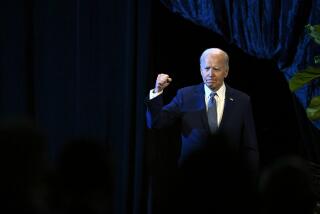POLITICAL BRIEFING
- Share via
DO THEY KNOW SOMETHING? Some of the Democrats’ most-promising potential presidential candidates are running into an embarrassment. Folks back home are sending them a message: Don’t bother challenging President Bush in 1992.
Polls in Iowa and Arkansas show that most voters believe Sen. Tom Harkin and Gov. Bill Clinton, respectively, should not enter the presidential race. And 63% of Virginians say that Gov. L. Douglas Wilder should not run. West Virginia Sen. John D. (Jay) Rockefeller IV has received mixed signals. The lone exception is Sen. Albert Gore Jr. (D-Tenn.): Tennessee voters endorsed his possible candidacy by a 9-point margin.
Republicans chortle that the home-folks know the Democratic hopefuls best but pollsters say the surveys show merely that Americans are satisfied with Bush and are not looking for a change. “So, for now, they would rather keep these people as their senator or governor,” one explains.
WHAT PRICE GLORY? Legislation to move next year’s California presidential primary to March, from June--intended to give California more national political glory by enhancing its role in the presidential selection process--is being threatened by local political concerns.
Although backers managed to get state Assembly approval for the measure--by scrapping their original scheme to stage two separate primaries--critics say that the new combined primary plan poses new problems involving reapportionment. With redistricting likely to drag on for months, candidates could be squeezed because they might not know the boundaries of the districts in which they will run soon enough to wage an effective campaign if the primary is in March.
Republican Senate leader Ken Maddy now considers it “less and less likely” that the bill will pass in that chamber.
RECRUITING BLUES: Top political strategists are worried that organizational problems in key party campaign committees are sidetracking planning for the 1992 U.S. Senate races.
The stakes are high: 21 Democratic and 14 Republican seats will be up for grabs. Yet, the GOP is still without first-tier candidates in Alabama, North Dakota, Florida, Nevada and Connecticut. And while Democrats have more candidates, organizational efforts have slowed. “We’re not setting any land-speed records from a political standpoint,” one insider says.
GOP professionals are blaming the tight grip of Sen. Phil Gramm (R-Tex.), new chairman of the National Republican Senatorial Committee. “Republicans have just one recruiter at the federal level--Phil Gramm,” one close observer rasps.
MATCHLESS FUNDS: Democratic presidential contenders face a potentially severe financial squeeze from new Treasury regulations governing the Federal Election Campaign Fund.
Worried that the fund might run short of cash, Treasury has decided to set aside the funds needed to finance the two national conventions and the general election campaign--leaving Democrats fearful that there will not be enough to go around in January when their primary candidates line up--along with President Bush--for matching funds to help underwrite the presidential race. One projection shows that the candidates will be eligible for $19 million in payments, but the primary kitty will only have $14 million in it. Democratic strategists complain that the pinch will not bother President Bush, who is expected to run unopposed and have plenty of money.
More to Read
Get the L.A. Times Politics newsletter
Deeply reported insights into legislation, politics and policy from Sacramento, Washington and beyond. In your inbox twice per week.
You may occasionally receive promotional content from the Los Angeles Times.









